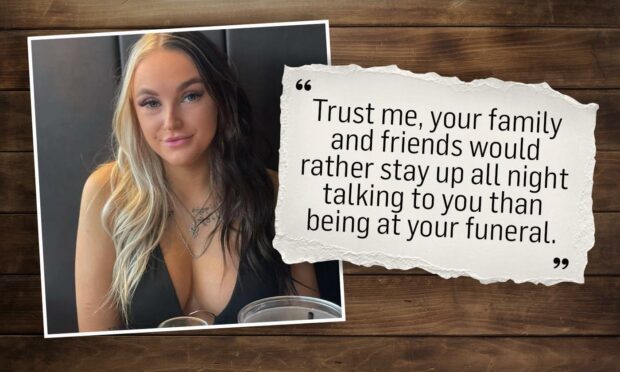Brogan Watt acknowledges it can be scary to reach out for mental health help. “But trust me,” she says, “your family and friends would rather stay up all night talking to you than being at your funeral.”
The 23-year-old Shetlander has been celebrating six months free of self-harm, after more than a decade battling a range of complex mental health issues.
Feeling “outcast and different” from a young age, she has attempted to take her life twice and was hospitalised for treatment last year.
But now, Brogan is looking forward to the future and urging anyone else facing similar difficulties to reach out to their families for help.
‘Help should be there for anyone’
Over the years, Brogan’s condition grew progressively worse. While she had managed to stop self-harming, she relapsed amid the Covid pandemic.
She has praised the “amazing” hospital staff who looked after her, and recently found comfort through private counselling, paid for by her employer, amid concerns she would would not get the same level of support on the NHS.
Earlier this year the Scottish Government announced a £120 million fund to address mental health waiting times and backlogs, particularly in the wake of the pandemic.
If you’re thinking of suicide and need help now, you can contact the Samaritans 24/7 free of charge on 116 123.
In the north of Scotland alone, there have been close to 9,000 reports of self-harm in the last five years. This includes around 370 in Shetland.
And last month we showed how the number of patients so ill they had to be hospitalised rose more than 10% in the last year alone.
Brogan said: “So many people aren’t that lucky or can’t afford it.
“Help should be there for anyone who feels like they’re struggling, not just people who can afford it or who are ‘ill enough’.
“I don’t even know what ‘ill enough’ means. The mental health service is so underfunded and understaffed.”
‘It gets easier’
Though Brogan has suffered at times, she believes there is a light at the end of the tunnel.
“I do still struggle now, but my friends and family have been the biggest support I’ve had,” she said.
“It’s scary to reach out at first because you might feel like a burden or no-one cares, but trust me, your family and friends would rather stay up all night talking to you than being at your funeral.
“When it feels like nothing can get better, know that isn’t true.
“I forced myself to hang on and I’m so glad.
“I have the best family, friends and boyfriend I could ask for.
“I have a new job in my dream career, I’m adopting two rescue cats, looking at houses to buy and planning the rest of my life. It gets easier.”
Stigma ‘definitely’ there
Brogan added: “I try to speak out about as much of my struggles as I feel comfortable doing, but I’m always worried I’ll be met with criticism.
“I can understand how difficult it is for people who aren’t as vocal as me.
“There’s a lot of information about depression out there, but rarer mental health conditions aren’t talked about as much and there is definitely a stigma surrounding it.”
